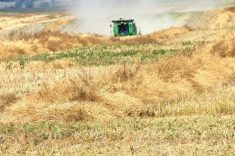Washington | Reuters — U.S. Agriculture Secretary Sonny Perdue said he expected the federal government to pay farmers a third and final tranche of 2019 trade aid a day after an initial deal with China was signed, Bloomberg reported on Thursday.
Washington and Beijing signed the Phase One pact on Wednesday, setting trade tensions between the two economic giants on pause, though some major outstanding issues remain.
Washington has paid two out of three parts of a $16 billion aid package announced in May to compensate farmers for losses sustained during the 18-month trade war, and the third had been expected in January (all figures US$). China imposed tariffs on imports of U.S. agricultural goods and other products in retaliation for U.S. tariffs on Chinese goods.
Read Also

American agriculture groups call for full renewal of CUSMA trade deal
American food and agriculture groups are calling for a full 16-year renewal of the Canada-United States-Mexico-Agreement (CUSMA).
The Trump administration had already spent $12 billion in trade aid for farmers in 2018. Perdue told Bloomberg in an interview that farmers should not expect a new bailout package this year, beyond the $28 billion already approved.
The U.S. Department of Agriculture did not immediately respond to request for comment on the interview.
In the Phase One trade agreement, China committed to buying an average $40 billion in agriculture goods this year and next, up from $24 billion in 2017 before the trade war.
The agreement did not remove China’s tariffs on key U.S. agricultural exports such as pork and soybeans, and many U.S. farmers have said they will need more assistance from the government to stay in business.
China bought roughly 60 per cent of U.S. soybean exports before the trade war and was a major buyer of sorghum, dairy and pork.
Chinese Vice-Premier Liu He said on Wednesday that Chinese companies will buy U.S. products “based on market conditions.” His comment increased skepticism of the deal and sent March soybean futures to a one-month low on the Chicago Board of Trade.
— Reporting for Reuters by Tim Ahmann and Eric Beech; additional reporting by Mark Weinraub in Chicago; writing by Makini Brice.
















